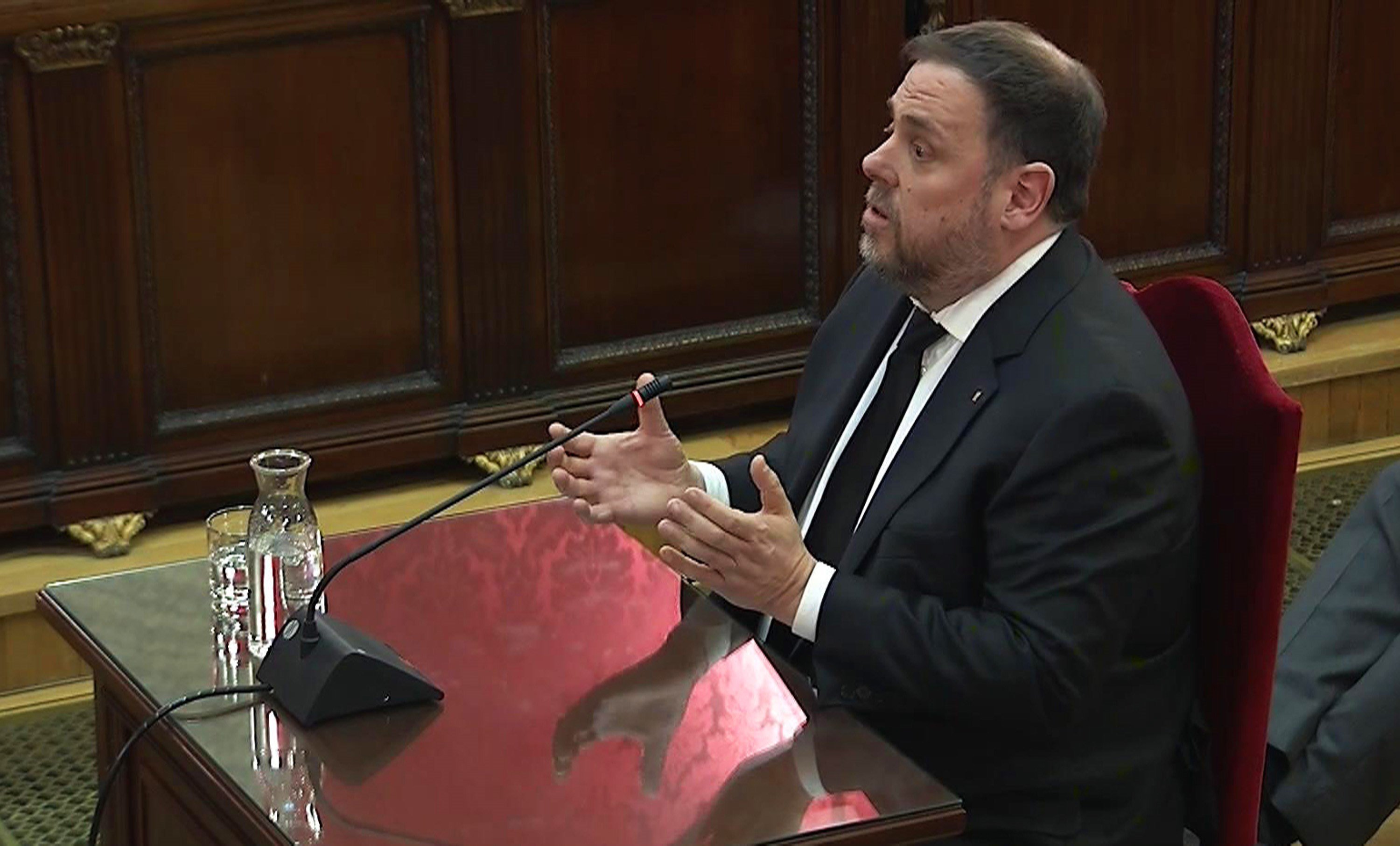"I'm being charged over my ideas and not the facts". That was how former Catalan vice-president Oriol Junqueras started his testimony before Spain's Supreme Court today on the third day of the Catalan independence trial. For that reason, he said he would make use of his right to only respond to questions from his defence counsel and not those from any of the prosecutors.
His remarks were markedly political in tone: "We'll keep trying, whatever the result of this trial". The first of the defendants to testify, he wanted to show himself to the world as having no regrets for their decisions. He took to the witness stand with a smile, firm and defiant, to counter the arguments that have kept him in prison for 15 months unable to speak.
First witness
After two days of preliminary questions from the lawyers over the case, Junqueras became the first to testify. He decided to respond in Spanish, saying that responding in Catalan via consecutive translation is not practical. In addition, "it gives me the opportunity to address Spanish society after a year and a half of forced silence", he said.
Responding to questions from his lawyer, Andreu Van den Eynde, he started by explaining that he is currently a deputy in the Catalan Parliament and then went over his political career, including his time as mayor of his hometown, Sant Vicenç dels Horts. He ended his first statement by saying: "I consider myself to be a political prisoner".
Right to self-determination
The preliminary questions from the lawyers had already suggested that the defendants would focus their defence on political and rights-based arguments, and that's what happened today with Junqueras. He gave a staunch defence of the right to self-determination, "the application of the principle of democracy". He listed countries which have allowed their citizens to exercise this right: Sweden, Denmark, the United Kingdom and Canada.
"Before independence supporters, we are republicans. Before that, we're democrats, and before that we're good people," said Junqueras. "From my point of view, none of what we've done is a crime: working for the independence of Catalonia isn't a crime, holding a referendum isn't a crime. I am in complete disagreement with the arguments of the prosecutions. It's utterly clear that it's a forced accusation", he continued, raising his voice.
This idea of the legitimacy of their actions was the main thrust of his testimony, which lasted an hour and forty-five minutes. Continuing to place the trial in a broader context, he said that "it's clear that [the conflict] hasn't been solved by putting people in prison".
Political rights
Van den Eynde did not ask Junqueras directly about the laws passed in the Parliament on 6th and 7th September 2017, nor the declaration on independence on 27th October that year, but that doesn't mean they didn't talk about the Parliament at all. "Parliamentary debate is protected by inviolability," Junqueras said. He called on his training as a historian to describe the centuries of precedent in Europe.
"Given the evidence that the independence movement was becoming a majority proposal in the Parliament, that which had been considered permitted because it was a minority, started to be treated as something that has to be avoided at all costs", he said, presenting the movement as a threat to the status quo in Spain.
He noted that everything they wanted to do was public knowledge, it was in their election manifestos and they were just trying to fulfil their democratic mandate.
Non-violence
"Our demonstrations have always been exemplary. Always without the slightest incident", he said, adding that they have "always, always" been held with respect. Violence is required for rebellion, the most serious charge he faces, under its definition in Spanish law. If convicted, he could face 25 years in prison.
"We've never supported any violent reaction, nor looked for one", he insisted, "there cannot be any doubt that we behaved peacefully".
Misuse of public funds
Junqueras denied the charges of misuse of public funds, saying that there was no budget item set to pay for the referendum. "The referendum didn't cost taxpayers anything," he said. "And with respect to the [polling] centres, public centres by definition cannot be rented and, as such, it's impossible to calculate a value".
Referendum violence
"It's obvious, it was seen on all the world's televisions: how they hit people who weren't doing anything, how they used equipment banned by law like rubber bullets, there was unjustified violence which contravened the legal mandate", he said, referring to the police operation against the 1st October vote. He said the violence seen was "unnecessary".
The evidence
One of the key documents presented in evidence by the prosecution is the so-called Enfocats document, a PowerPoint including strategy and organisational details. Junqueras said he learnt of the document's existence on 2nd November 2017, when he was ordered into pretrial detention. He described it as an "outlandish, apocryphal document and I don't know anyone who had seen it before it was added to the case".
The other quotes
On Spain: "On many occasions, in the Parliament and outside, I've said that I love Spain, because it's true. I love Spain, the peoples of Spain, Spanish culture".
On the Catalan conflict: "The ballot box is the solution".
On the referendum: "Voting isn't a crime; preventing it by force is".
"I accepted going to prison, but every time I have the opportunity to speak, I will insist on the same thing: we all need a solution. All democrats have to feel called upon to look for a political solution based on the democratic principle, scrupulous respect for social harmony, fundamental rights, human rights".

